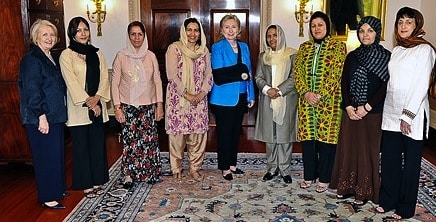
The American reconstruction campaigns in Iraq and Afghanistan have, and continue, to spend billions of taxpayer dollars on pointless projects seemingly designed solely to funnel money into the pockets of US government contractors.
Empowering Women
These projects (Iraq War examples are detailed in my book We Meant Well: How I Helped Lose the Battle for the Hearts and Minds of the Iraqi People seem to bounce between the merely pointless, such as dams that are never completed and roads to nowhere, to the absurdly pointless.
One ongoing theme under the absurdly pointless category has been the “empowerment of women.” In both countries, the US has acted on the assumption that the women there want to throw off their hijabs and burkas and become entrepreneurs, if… only… they knew how. Leaving aside the idea that many women throughout the Middle East and beyond prefer the life they have been living for some 2000 years before the arrival of the United States, the empowerment concept has become a standard.
However you may feel about these things, and the programs are in some part designed as “feel good” but cynical gestures to domestic American politics, the way “empowerment” is implemented is absurd. Lacking any meaningful ideas, women are “empowered” by holding endless rounds of training sessions, seminars, roundtables and hotel gatherings where Western experts are flown in laden with Powerpoint slides to preach the gospel. Over time, in my personal experience in Iraq at least, these proved so unpopular that the only way we could draw a crowd (so we could take pictures to send to our bosses) was to offer a nice, free lunch and to pay “taxi fare” far in excess of any reasonable transportation costs; bribes.
One Army colonel I worked with was so into the goals of the program that he called these things “chick events.”
Women’s Empowerment in Afghanistan
So much for Iraq. How’s it going for women’s empowerment in Afghanistan?
Not well, at least according to the latest report by the Special Inspector General for Afghan Reconstruction (SIGAR). Some highlights from that report include an inquiry into USAID’s Promoting Gender Equity in National Priority Programs (Promote), which has been highlighted as USAID’s largest women’s empowerment program in the world. Promote has left SIGAR with a number of “troubling concerns and questions,” to wit:
–SIGAR is concerned that some very basic programmatic issues remain unresolved and that the Afghan women engaged in the program may be left without any tangible benefit upon completion. SIGAR is also concerned about whether USAID will be able to effectively implement, monitor, and assess the impact of Promote.
–Many of SIGAR’s concerns echo those of Afghanistan’s First Lady. To quote Mrs. Ghani, “I do hope that we are not going to fall again into the game of contracting and sub-contracting and the routine of workshops and training sessions generating a lot of certificates on paper and little else.”
–Promote has been awarded to three contractors: Chemonics International, Development Alternatives, Inc., and Tetra Tech, Inc. The overall value of the contracts is $416 million, of which USAID is funding $216 million and other—still unidentified—international donors are expected to fund $200 million.
–USAID does not have any memoranda of understanding between any of the three Promote contractors and the Afghan government.
Other than that Mrs. Lincoln, how was the play?
Reprinted with author’s permission from his website, We Meant Well.


